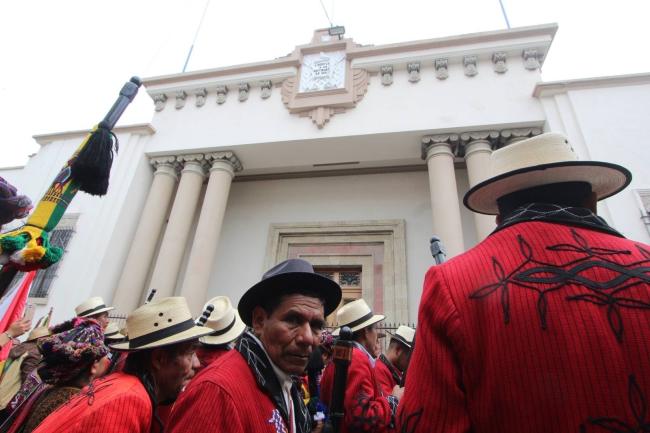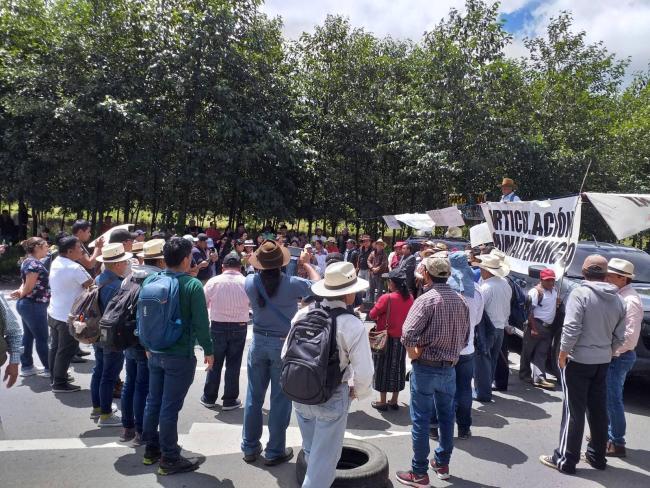
Leer esta entrevista en español.
This interview is the second of a three-part series of conversations with Guatemalan activists.
Just 10 years separate two historic events in which the Association for Justice and Reconciliation (AJR) has actively participated. In 2013, the AJR was a plaintiff in the case that sentenced former dictator Efraín Ríos Montt for genocide. This conviction was a landmark, internationally recognized as the first time a former dictator was sentenced for genocide in his own country’s courts. A decade years later, in 2023, the AJR was in the streets together with thousands of Guatemalans, responding to the call of the 48 Cantones de Totonicapán and other Indigenous authorities for an indefinite national strike in defense of democracy. Ten years is less than half the length of Guatemala’s internal armed conflict, when the state committed genocide against the Maya Ixil people, among others, under Ríos Montt’s command.
AJR was created in response to Guatemala’s long and bloody internal armed conflict. Waged from 1960 to 1996, the conflict pitted the Guatemalan state—with support primarily from the United States, but also from Israel—against a variety of social and political sectors and movements seeking to transform miserable conditions in the country. But the state’s “internal enemy” doctrine justified the extermination of entire Indigenous communities, including adults not involved in military confrontations, as well as children, land, animals, and infrastructure. Over the 36-year conflict, approximately 200,000 people were killed or disappeared, and countless others suffered sexual violence. According to the 1999 UN-sponsored Commission for Historical Clarification report, of the victims identified “83 percent were Indigenous Maya [and] 93 percent of these human rights violations were carried out by government forces.” Most of the state’s atrocities were carried out in the regions of Huehuetenango, Chimaltenango, Ixil, Ixcán, Rabinal, and Baja Verapaz. Survivors from Mayan communities in these regions created the AJR.
Although it launched publicly in 2000, the AJR had been organizing for years before that. Some people organized from exile, in Mexico, where they had fled to survive state violence. Others organized from the Communities of People in Resistance in the mountains. There, and among the communities where massacres, sexual violence, and disappearances had occurred, meetings of survivors and relatives of the victims began to take place. Eventually the communities decided that they wanted to formalize their organization to seek justice and to ensure that such atrocities would never happen again. Thus the AJR was born, organized to identify where their loved ones were buried, conduct Mayan ceremonies and exhumations, create photographic reports and written documentation, and eventually become plaintiffs in landmark transitional justice cases in Guatemala.
Currently, the AJR is involved in important cases such as the Ixil genocide case against Benedicto Lucas García, former head of the Guatemalan army, and Manuel Antonio Callejas y Callejas, former head of military intelligence. However, ever since the successful sentencing of Ríos Montt on genocide charges, the Pacto de Corruptos has unleashed efforts to obstruct justice and consolidate impunity. To give just two examples: In December 2022, former judge Miguel Ángel Gálvez, who presided over the pre-trial phase of the Ixil genocide case, among other war crimes and corruption cases, went into exile due to threats to his life and family. In September 2023, in the midst of the political crisis surrounding Semilla, the party of the new president Bernardo Arévalo, the Guatemalan Congress proposed an amnesty law for former military members who committed crimes during the armed conflict.

In this context of corruption, impunity, and obstruction of justice, the AJR took to the streets with the indefinite national strike convened by Indigenous authorities, supporting peaceful blockades in Chimaltenango, Huehuetenango, and Alto and Bajo Verapaz, as well as the encampment in front of the Public Prosecutor’s Office in the capital city.
Romelia, whose last name has been omitted for security reasons, is a Maya Achí woman and survivor of state massacres in the Baja Verapaz region during the internal armed conflict. She is president of the Board of Directors and legal representative of the AJR—responsibilities she holds for a period of two years, in accordance with the democratic rotation of leadership in the AJR. In her role, Romelia is a litigant in the cases in which the AJR is a plaintiff, which means that her attendance at the hearings is necessary for them to proceed.
We spoke with Romelia in Zone 1 of Guatemala City on November 8, 2023, the 38th day of the national strike. Our conversation has been edited for length and clarity.
NISGUA: AJR has prioritized the work of historical memory and transitional justice in the aftermath of the armed conflict. What have been AJR’s greatest achievements since its founding, and its greatest challenges?
Romelia: AJR was born from the survivors of the internal conflict. We are the records of the regions that suffered the conflict. They tried to wipe us [Indigenous communities] out, but they did not succeed. We rise up to seek justice. That is AJR’s mission. For historical memory we have achieved exhumations, photos of the victims, and Mayan ceremony. This means that we seek justice because of our memory. We did not invent our memory. We lived it. So, no one can take that historical memory away. In Rabinal, Baja Verapaz, for example, we were able to do exhumations and [to install] monuments with the names of the people who died there during the conflict. As for dignification, we have not achieved [much]. But we have achieved justice. We were able to win a sentence establishing that in Guatemala there was genocide.
NISGUA: That sentence in 2013, against former dictator General Efraín Ríos Montt, is internationally recognized for being the first time that a country’s own judicial system pronounced that there was genocide. Proving that there was genocide in Guatemala is one of the great contributions of AJR’s struggle. As you said, that sentence goes beyond the criminal proceedings, because it is part of historical memory. Can you tell us more about how AJR experienced that great success?
Romelia: We were happy, because we have always kept on struggling. We never became bitter, nor did we drift away. We resisted, just as we resisted in the mountains when we suffered violence [during the armed conflict]. So that is how we have resisted now. We are not afraid to tell the truth. That is an achievement. We are no longer afraid. We tell the truth, and we seek the justice that they are now delaying.
[The Pacto de Corruptos] no longer wants justice to be sought [for genocide and crimes against humanity during the conflict]. But we do not remain silent. We must always continue. Right now, for example, we are struggling for financial resources because almost everything is being taken away. Donors no longer want to support us, perhaps because of fear [of criminalization], or because they no longer want us to carry out justice.
NISGUA: The Movimiento Semilla party won the presidential election, and today marks day 38 of the indefinite national strike to defend democracy. [Editor’s note: The 105-day strike ended on inauguration day, January 14, when Congress and President Arévalo were sworn in.] What do you expect or hope from Semilla in the next four years?
Romelia: For us, the struggle is to prevent the military from coming down [on Semilla]. [The military] doesn’t want [Semilla] to enter because they have taken over the institutions of justice. So, there is no justice. For example, right now, they are trying to establish an amnesty so that we can no longer look for those who committed the massacres; they want their buddies to get out of jail. What they want is to be the ones in charge, and not us. The Indigenous community is worthless to them. We are trying to change the country. That is why the communities and regions are rising up—not for the [Semilla] party, but for democracy. We don’t allow ourselves [be pushed around].
But we do hope that [with Arevalo] there will be a change toward seeking justice with memory, and that there will be compensation [and reparations] for the survivors of the armed conflict. For example, [before the conflict] my dad used to have bees, and it produced income. But when everything happened, my dad fled. They burned our house down, they took our animals, they burned everything, they threw it all away. We were left with a scarcity of resources. [The Pacto de Corruptos] is in power of the Guatemalan economy. They are getting rich while we barely have enough for food and the daily essentials. So that’s why we are fighting.
NISGUA: The 48 Cantones of Totonicapán, together with other Indigenous authorities, called an indefinite national strike for democracy. After the strike, what does the AJR anticipate for its own future and the future of Guatemala?
Romelia: [The country’s situation] is not going to change in four years. But we hope that this struggle has made visible what we want. For example, [because of the national strike] we can now see who [the corrupt] are and what they are doing. So [we hope] Semilla doesn’t get together with those people who only help each other and forget about the poor teachers, the people who are suffering hunger because of drought, the roads [in bad condition]. Let’s hope that Arévalo takes office, because he is the only hope of support for the people [from within the state].
NISGUA: Is there anything you would like to add regarding cases of justice or the co-optation of the judicial system?
Romelia: What we want is for President Arévalo to ask for the resignation [of corrupt officials]. The government [of Alejandro Giammattei] doesn’t want to ask for their resignations, because how are they going to ask for resignations for their buddies? That’s what we expect from the new government—that the justice sector does its job. Right now they are prosecuting those who are telling the truth, putting them in jail or exiling them. What they are doing is injustice. So we hope that [Semilla] will remove those who don’t do their jobs. [Editor’s note: On January 19, 2024, Arévalo summoned Attorney General Consuelo Porras, accused of corruption, for a January 24 meeting, where it was speculated that a process to remove her from her position would begin. Porras declined to attend the meeting, stating after months of silence: "I will not resign."]
NISGUA: Is there anything you would like to communicate to the international community, involved in their own social and political movements for justice?
Romelia: We ask for economic support and solidarity. If we don’t get funds, we will no longer have technicians, [the professionals who] ensure that exhumations are carried out in each region. [Technicians] tour the community, [gather] information with the victims and survivors, [investigate] where there are human remains, where they buried [people], and then the exhumations help the cases [for justice] in the courts. That is the [financial] concern. But we have the strength, and fear has not taken it away from us.
The Network in Solidarity with the People of Guatemala (NISGUA) is a historic solidarity organization working since 1981 to build and strengthen ties between the people of the United States and Guatemala in the global struggle for justice, human dignity, and respect for the Earth.

